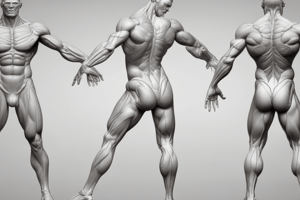Podcast
Questions and Answers
What does contractility refer to in muscle tissue?
What does contractility refer to in muscle tissue?
- The ability to return to original length
- The ability to respond to a stimulus
- The ability to forcefully shorten (correct)
- The ability to stretch without damage
Which property of muscle tissue allows it to respond to stimuli from motor neurons or hormones?
Which property of muscle tissue allows it to respond to stimuli from motor neurons or hormones?
- Contractility
- Elasticity
- Excitability (correct)
- Extensibility
What is the role of extensibility in muscle function?
What is the role of extensibility in muscle function?
- To allow muscles to be forcefully shortened
- To help muscles recoil after stretching
- To respond to neurological signals
- To enable muscles to stretch and allow movement (correct)
Which property of muscle tissue describes its ability to return to its original length after being stretched?
Which property of muscle tissue describes its ability to return to its original length after being stretched?
What condition describes a lack of extensibility in muscle tissue?
What condition describes a lack of extensibility in muscle tissue?
What characterizes the property of contractility in muscle tissue?
What characterizes the property of contractility in muscle tissue?
What is the consequence of a lack of extensibility in muscle tissue?
What is the consequence of a lack of extensibility in muscle tissue?
Which of the following best describes the property of elasticity in muscle tissue?
Which of the following best describes the property of elasticity in muscle tissue?
Which property of muscle tissue allows it to respond to motor neuron stimulation?
Which property of muscle tissue allows it to respond to motor neuron stimulation?
What happens when muscles contract according to their properties?
What happens when muscles contract according to their properties?
How do extensibility and contractility interact during elbow flexion?
How do extensibility and contractility interact during elbow flexion?
Flashcards are hidden until you start studying
Study Notes
Properties of Muscle Tissue
- Contractility: Muscle cells can forcefully shorten, allowing for movement like flexing the elbow. Muscles can only pull, not push.
- Excitability: Muscles can respond to stimuli, such as those from motor neurons or hormones.
- Extensibility: Muscles can be stretched, like the elbow extensor muscles extending to allow elbow flexion. Lack of extensibility is called spasticity.
- Elasticity: Muscles can recoil and return to their original length after being stretched.
Muscle Tissue Properties
- Contractility: Muscle cells can forcibly shorten. This allows for movements like flexing the elbow by contracting the biceps brachii muscle. Muscles can only pull, not push.
- Excitability: Muscles can respond to stimuli. These stimuli can be from motor neurons or hormones.
- Extensibility: Muscles can be stretched. For example, to flex the elbow, the extensor muscles must extend to allow for the movement. A lack of extensibility is called spasticity.
- Elasticity: Muscles can bounce back to their original length after being stretched.
Studying That Suits You
Use AI to generate personalized quizzes and flashcards to suit your learning preferences.




